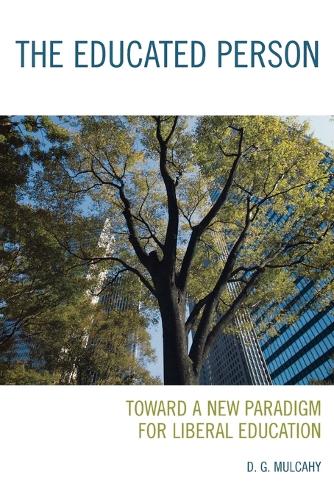
The Educated Person: Toward a New Paradigm for Liberal Education
(Paperback)
Publishing Details
The Educated Person: Toward a New Paradigm for Liberal Education
By (Author) D. G. Mulcahy
Bloomsbury Publishing PLC
Rowman & Littlefield Publishers
27th March 2008
United States
Classifications
General
Non Fiction
Education / Educational sciences / Pedagogy
Higher education, tertiary education
Philosophy and theory of education
370.112
Physical Properties
Paperback
256
Width 155mm, Height 230mm, Spine 18mm
363g
Description
Liberal education has long been a fascination for scholars in a variety of disciplines and is closely associated with the idea of the educated person. Seen at one time as a matter for colleges and universities, over the years it has become central to the debate surrounding general education in high school and even the earlier grades. Yet so many and varied are the uses of the term 'liberal education' that the question arises of whether and how the idea is any longer a useful or helpful construct. In what way might it speak helpfully to educational challenges we face today In what ways does it still speak helpfully to educational challenges we face today In what ways might it be a guide as we search for a better way forward These are the central questions that are addressed in this book. In doing so, the positions of three theoristsJohn Henry Newman, Mortimer J. Adler, and Jane Roland Martinwho have written about liberal education in a compelling way and from different perspectives are selected for close analysis. The analysis is built upon to fashion a new ideal of the educated person and a new theory of liberal education.
Reviews
What does it mean to be an educated person in the 21st century Is the idea of liberal education relevant in today's world For anyone who takes these questions to heart, The Educated Person is a book to read once, twice, and then again. Mulcahy's survey of the educational thought of the 19th and 20th centuries is breathtaking, his close readings of three historical theories of liberal education that have never before been juxtaposed are unparalleled, and the new paradigm of liberal education he proposes will be a focus of scholarly attention for years to come. -- Jane Roland Martin, Professor of Philosophy Emerita, University of Massachusetts, Boston
This book is an insightful new analysis of the issues surrounding the definition of what a liberal education could and should be....It is well researched and easy to follow....Mulchay is very well qualified to write on this topic....The book would be of interest to higher education faculty and graduate students....Recommended. * Choice Reviews *
Daniel Mulcahy outlines a new and radical approach for Liberal Education in which he attempts to revolutionize the understanding of the usefulness of liberal education by employing pragmatism, particularly surrounding the world of work and everyday life.He has created a lucid argument that will no doubt ignite the perennialist school of thought, confound the chattering class, and quite possibly find itself smack in the middle of the new paradigm that he suggests. Mulcahy's work is not one that callson division or consternation, but rather a higher value with an intense commitment to vocation of education. In an Age of Distraction, it is a serious work that asks for and demands serious attention. The work of others in the field of liberal education may differ with Mulcahy in the years to come, but they cannot go without answering his call.. -- Perry Lewis, 2009 * Studies in Philosophy and Education *
Clearly written and based on close and rigorous argument, The Educated Person is a work of extraordinary erudition and admirable sensitivity to the real world of teaching and learning. Informed by a vision of personal and communal well-being and also by immense wisdom and common sense, Mulcahy's book is set to become a standard text in the philosophy of education. I have no doubt but that it will be widely referred to for many years to come. -- Kevin Williams, Ph.D., Mater Dei Institute, Dublin City University; former president, Educational Studies Association of Ireland
Daniel Mulcahy outlines a new and radical approach for Liberal Education in which he attempts to revolutionize the understanding of the usefulness of liberal education by employing pragmatism, particularly surrounding the world of work and everyday life. He has created a lucid argument that will no doubt ignite the perennialist school of thought, confound the chattering class, and quite possibly find itself smack in the middle of the new paradigm that he suggests.
Mulcahy's work is not one that calls on division or consternation, but rather a higher value with an intense commitment to vocation of education. In an Age of Distraction, it is a serious work that asks for and demands serious attention. The work of others in the field of liberal education may differ with Mulcahy in the years to come, but they cannot go without answering his call.
Author Bio
Daniel G. Mulcahy is a professor in the School of Education and Professional Studies at Central Connecticut State University and former professor of education at University College, Cork, Ireland. He is a past president of the Educational Studies Association of Ireland and of The New England Philosophy of Education Society and a two-time recipient of the Fulbright award.
